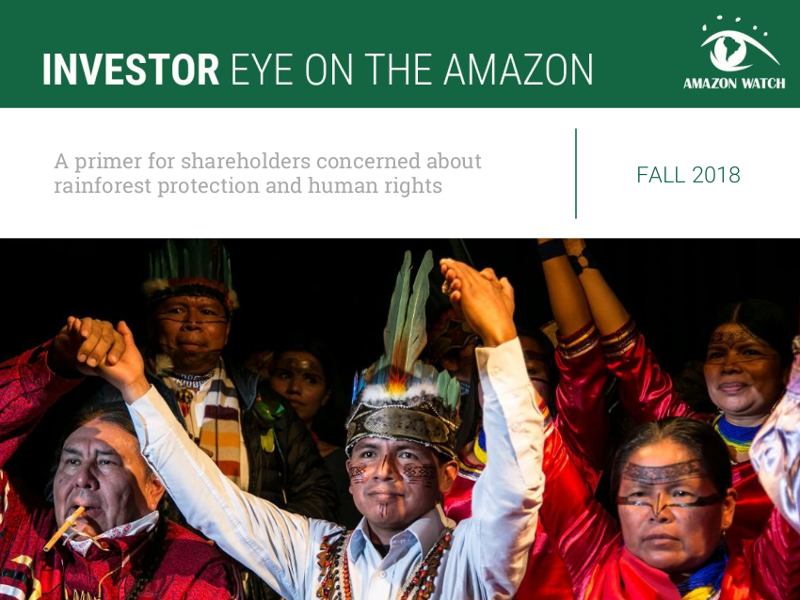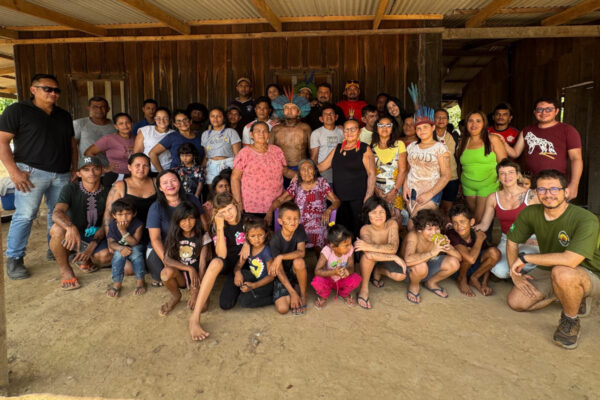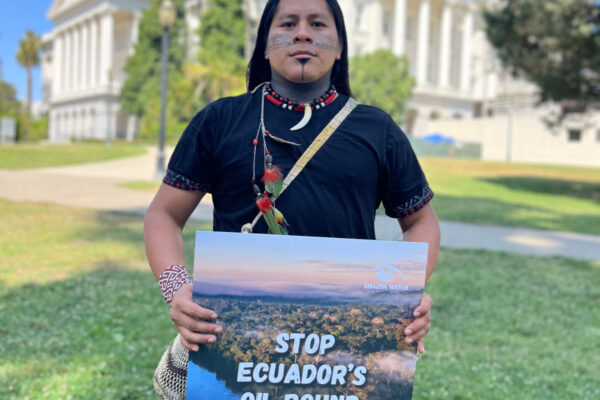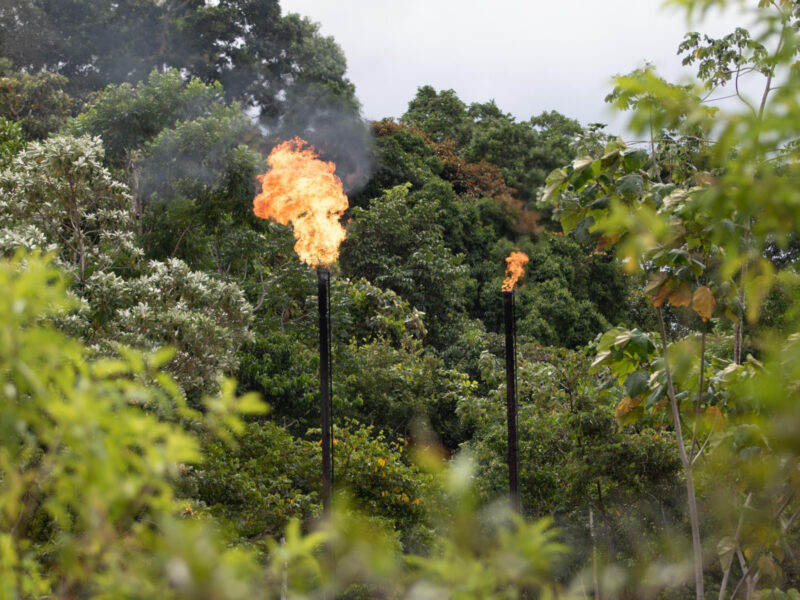Report from the Front Lines
Across the Amazon, Earth Defenders who speak out and organize against the industrial exploitation of natural resources and usurpation of traditionally-held land often face threats and attacks. Many of these threatened Earth Defenders are indigenous peoples, given that much of the most sought-after resources are found in the ancestral territories of the nearly 400 distinct indigenous peoples of the Amazon. A primary driver of these dangerous conflicts is the failure of companies and governments to properly seek the consent of communities affected by the proposed projects.
That failure very often results in a losing prospect for all stakeholders involved – the communities, the governments, and the companies. Without legitimate buy-in from local groups, companies across the Amazon have seen their projects paralyzed by protest. In Ecuador’s southern Amazon alone, five companies declared force majeure in the last decade and ultimately abandoned their projects, stranding their assets while harming their reputations and their bottom lines.
While most Amazon nations have ratified International Labor Organization Convention 169 (ILO 169), which stipulates consultation of indigenous communities to be affected by proposed industrial development and extractive industry projects, in a process known as Free, Prior, and Informed Consent (FPIC). Some countries have national laws that provide for even more stringent requirements to that effect, but in practice both public and private projects run roughshod over the rights and interests of these communities to free, prior, and informed consent.
In Brazil, the Amazon is particularly threatened by the rise of the extreme right wing leader Jair Bolsonaro to the presidency. According to researchers at Brazil’s National Institute for Space Research, his proposals to slash environmental and human rights protections on the Amazon’s forests – principally to serve the interests of agribusiness and extractive industry – would cause deforestation to spike 268%, leading to nearly 10,000 square miles of annual forest loss. His promise to open indigenous territories to industrial mining indicates that disastrous projects such as the Belo Sun mega-gold mine on the banks of the Xingu River would likely move forward.
The context in Ecuador is somewhat different. There, the U.N. Special Rapporteur on the Rights of Indigenous Peoples Victoria Tauli-Corpuz made a historic visit to Ecuador last month, meeting with national indigenous leaders and local communities as well as government representatives. Her visit came a decade after the country’s 2008 Constitution bolstered indigenous rights and established rights for nature. At the end of her 11-day trip, Tauli-Corpuz concluded that indigenous rights have become “invisible” as the country pursues oil and mining projects. “So-called development projects have violated and continue to violate their fundamental rights,” said Tauli-Corpuz, and “serious violations of the constitutional provisions” have occured.
Meanwhile, Ecuador’s Hydrocarbon Minister unexpectedly announced last month that an oil auction planned for the end of 2018 would be reduced from the original sixteen blocks to two. Minister Carlos Pérez cited “conflict with communities” and risk for companies as the reason for the 14-block, 2.8 million-acre reduction in the upcoming auction. Indigenous nationalities have long opposed oil drilling in this area and decried the government’s failure to properly conduct a process of FPIC with local communities. Subsequent community conflict played a major role in the departure of multiple companies, including ConocoPhillips, Burlington Resources, ARCO, Perenco, and CGC.
Minister Pérez alleged that no problem existed in auctioning the remaining two blocks (86 and 87) because, “there aren’t any indigenous [people] there.” However, the two blocks, located along the Peruvian border, overlap with the titled territory of the Sapara, Shiwiar, and Kichwa nations, and sightings of indigenous peoples living in voluntary isolation have been reported.
Key Cases to Watch
Brazil: Complicity in Destruction
In September, Amazon Watch released a new report that identifies key Brazilian political actors behind an ongoing assault on the Amazon rainforest and exposes the global corporate and financial entities that support them. The Complicity in Destruction report reveals how the supply chains of leading brand names like Coca-Cola and the portfolios of asset managers like BlackRock finance Brazil’s destructive agroindustrial and extractive sectors, imperiling the Brazilian Amazon, indigenous rights, and global climate stability. In 2019, we will update our findings to identify new leverage points among global corporate actors whose actions could either enable or moderate the Bolsonaro government’s regressive agenda.
GeoPark
Peru’s Achuar indigenous people of the Pastaza River, with ancestral territories covering 2 million acres of primary rainforest along the border with Ecuador, have successfully fought to keep their territory free of extractive industries – whether oil, mining, or logging companies – for several decades.
They are keenly aware of the contamination and grave health issues caused by the oil industry’s more than 40-year presence in neighboring indigenous communities. Case in point: in 2013, the Peruvian government declared 2.7 million acres of nearby river basins as environmental emergency zones because of oil pollution, and the Northern Peruvian Pipeline has spilled dozens of times in recent years, including in the Achuar community of Chuintar.
Having expelled oil companies like ARCO, Occidental Petroleum, and Talisman from the Block 64 oil concession, the Achuar federation FENAP – representing 45 communities in the Pastaza and Morona watersheds – has reiterated its opposition to the entry of GeoPark, a Chile-based oil company. In a recent development, 65 communities of the Wampis Nation joined FENAP in calling for Block 64 to be annulled for violating indigenous rights to prior consultation.
GeoPark is currently awaiting Peruvian governmental approval of its environmental impact study for Situche Central, which FENAP has denounced because the process excluded many communities within the area of influence and applied the principle of “citizen participation” instead of free prior, and informed consent. Amazon Watch also published a four-page critical analysis of the study, available here.
The company is supporting a small handful of pro-oil communities – cultivated for years by previous oil companies – to request expansion of their land titles into the territories of other communities. Tensions among Achuar communities and with neighboring Wampis communities have skyrocketed in recent months, and they are likely to worsen if the company continues to advance with its plans.
BlackRock
BlackRock, the world’s largest investment firm, holds moreshares in fossil fuel and other industries that cause climate change than any other company in the world. That means that BlackRock’s portfolio represents a huge liability for its role in putting the planet on a path towards runaway climate change, despite CEO Larry Fink’s proclamations that businesses should serve a “social purpose,” play a positive role in society, and think “long term.”
Larry Fink wants to be thought of as a socially-responsible corporate leader, yet BlackRock refuses to divest from tar sands, coal, Arctic oil, Amazon crude, and rainforest destruction, and it votes against shareholder demands for climate action and transparency. That is not social responsibility.
Among BlackRock’s holdings are companies like Bunge, a commodities exporter that buys massive amounts of soy from the Brazilian Amazon, and ENI, an oil company drilling in the Ecuadorian Amazon without community consent (more on ENI below). Companies like these threaten the most biodiverse rainforest in the world and would violate indigenous peoples’ rights and territories.
This hypocrisy and continued financing of the industries causing climate change and human rights abuses is a BIG Problem. That’s why Amazon Watch has joined with the Sierra Club, Friends of the Earth, and the Sunrise Project to launch a new campaign: BlackRock’s BIG Problem. Together, we’re calling on BlackRock to stop working with companies that destroy the climate and our precious ecosystems like the Amazon.
JPMorgan Chase
JPMorgan Chase, the world’s sixth largest bank, is also one of the world’s biggest investors in extreme fossil fuel projects and oil companies operating in the Amazon. JPMorgan’s investments in Amazon crude include GeoPark, ENI, Frontera, and the parent companies of Andes Petroleum. The company also finances the US-based commodity trader Bunge, recently fined for illegal deforestation in its Brazilian supply chains, and the notoriously corrupt Brazilian meat-packing company JBS, which routinely sources cattle from illegally-cleared forests.
Despite significant pressure by non-governmental organizations and indigenous communities, JPMorgan CEO Jamie Dimon has refused to take action to curb his company’s investments in oil and gas companies, whether in the Amazon or elsewhere in the world. In coalition with dozens of organizations, Amazon Watch and our indigenous allies are continuing to ramp up the public and political pressure on JPMorgan, through protests and participation in the company’s annual general meeting and days of action.
Equator Principles
Amazon Watch has joined dozens of other organizations as a member of the Equator Banks Act! campaign, a coalitional effort focused on ensuring that the 96 signatories to the Equator Principles respect indigenous communities’ right to FPIC and stop financing climate disasters. As a result of our campaigning, the Equator Principles Association has committed to a revision process, which will lead to the creation of the fourth version of the principes (EP4 for short). Over a year after this process began, the Association continues to drag its feet on concrete action, but we continue working to ensure that banks hear from impacted communities and other members of civil society and that the revision yields concrete results that benefit people and planet.
Chevron
Chevron’s new CEO Mike Wirth still faces ongoing enforcement action in Canada, a multi-billion dollar liability, continued shareholder discontent, and growing grassroots pressure for the company’s toxic legacy in Ecuador. This year, 36 institutional shareholders, collectively representing over $109 billion in assets under management, called on Wirth to finally redress Chevron’s toxic dumping in Ecuador. Grassroots actions against Chevron also continued to grow as close to a million Avaaz members wrote to one of Chevron’s largest investors, Vanguard Group, to demand it cut its investments if Chevron does not clean up the rainforest.
In 2019, Canada’s Supreme Court will hear an appeal of the ruling of the lower court that Chevron-Canada’s assets could not be seized to cover Chevron Corporation’s liabilities. The Supreme Court will also be presented with evidence demonstrating that Chevron’s retaliatory suit in the U.S. was based on testimony from a bribed witness who since admitted to perjury and evidence disproving Chevron’s key claims of fraud and “ghostwriting” of the Ecuadorian verdict.
Ecuador’s government is also appealing the ruling of three-member investor-state arbitration panel that found in favor of oil giant Chevron, ruling that it violated a trade agreement with the U.S. when the country’s courts found Chevron liable.
ENI in Ecuador’s Block 10
In 2010, the Ecuadorian government renegotiated its oil contract with Italian oil giant ENI, dramatically expanding its Block 10 concession in Ecuador’s central Amazon rainforest to include three major new oil fields, known as Onglan, Moretecocha, and Jimpikit. The changes to the block’s boundary overlap additional areas of the indigenous territories of the Shuar, Kichwa, and the Achuar. The government failed to properly consult – or even inform – the communities, violating the country’s constitution and proper FPIC standards in ILO 169.
These – along with other environmental and human rights abuses and violence against women associated with ENI’s operations – were denounced by Kichwa leaders in a meeting with Ecuadorian President Lenin Moreno. Soon after the meeting, the Italian nonprofit organization A Sud confronted ENI at its annual shareholder meeting in Italy over these issues.
Days later, unknown assailants attacked the home of Salomé Aranda, a Kichwa leader and outspoken critic of ENI who participated in the meeting, hurling rocks at her house and threatening her and her family. The government promised to investigate her case, as well as the violations by ENI outlined by Salomé and her community. However, it has yet to conduct proper investigations of either.
Get in touch
If you are interested in learning more about Amazon Watch’s campaigns and opportunities for shareholders and sustainable investors to engage with our advocacy efforts, please reach out to our Climate Justice Campaigner Zoë Cina-Sklar at [email protected].














